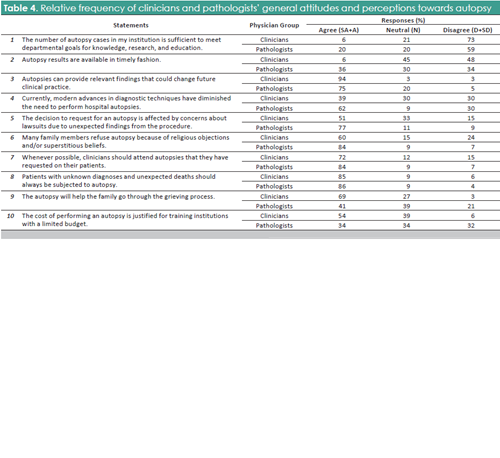Attitudes and Perceptions of Filipino Clinicians and Pathologists towards the Autopsy as a Medical Tool
DOI:
https://doi.org/10.21141/PJP.2023.13Keywords:
autopsy, pathologists, clinicians, attitudes, perceptionsAbstract
Background. Globally, autopsy rates have been continually declining over the course of several years. Previous studies have shown that the perception of pathologists and clinicians may serve as significant factors which may affect the performance of autopsy and contribute to its decreased rate. This study was conducted to determine the attitudes and perceptions of Filipino clinicians and pathologists toward the autopsy as a medical tool.
Methodology. This is a cross-sectional descriptive survey of two groups of physicians. Forty-four (n = 44) pathologists nationwide and thirty-three (n = 33) clinicians from Central Visayas participated in the study. A total of seventy-seven (n = 77) physicians completed a survey using a standardized online questionnaire.
Results. Of the 77 respondents, 94% of clinicians and 75% of pathologists believed that autopsies could provide relevant findings that could change future clinical practice. Despite this, only 6% of clinicians and 20% of pathologists indicated that the number of autopsy cases in their institutions was sufficient. With regards to their practice, pathologists most strongly agreed (mean = 4.30) that material for medico-legal autopsies should be readily available for teaching and research. However, they most strongly disagreed (mean = 2.00) that residents receive adequate training in performing medico-legal autopsies. The two groups of physicians surveyed determined that there is a deficiency in the number of autopsy cases. This is further influenced by clinicians’ concerns about litigation, religious/superstitious beliefs, and the delay in releasing autopsy results. Furthermore, pathologists specified that performing autopsies was excessively time-consuming with an unjustifiable cost. Sixty-two percent of the pathologists signified more strongly than the clinicians that modern diagnostic techniques have diminished the need to perform hospital autopsies. Nonetheless, 86% of Filipino physicians acknowledged that the autopsy is an important medical tool that should be performed for patients with unknown diagnoses and unexpected death. The number of observed and/or performed autopsy cases was a major factor that affected the pathologists’ attitudes and perceptions toward autopsy.
Conclusion. In general, there is recognition of the autopsy’s usefulness as a medical tool among the pathologists and clinicians surveyed. However, the lack of cases referred for autopsy remains a challenge undermining the benefits that are derived from its performance.
Downloads
References
Hoyert D. The changing profile of autopsied deaths in the United States, 1972-2007. NCHS Data Brief. 2011;67:1-8. Hyattsville, MD: National Center for Health Statistics. Accessed August 12, 2020. https://www.cdc.gov/nchs/data/databriefs/db67.pdf.
Hooper JE, Geller SA. Relevance of the autopsy as a medical tool: a large database of physician attitudes. Arch Pathol Lab Med. 2007;131(2):268-74. https://pubmed.ncbi.nlm.nih.gov/17284112. https://doi.org/10.5858/2007-131-268-ROTAAA.
Hull M, Nazarian RM, Wheeler AE, Black-Schaffer WS, Mark EJ. Resident physician opinions on autopsy importance and procurement. Hum Patho. 2007;38(2):342-50. https://pubmed.ncbi.nlm.nih.gov/17134740. https://doi.org/10.1016/j.humpath.2006.08.011.
Knowledge Management and Information Technology Service Department of Health. Medical certification of death: handbook for Filipino physicians: Guidelines and Procedures, 2nd ed. PDFCoffee. 2016. https://pdfcoffee.com/medical-certification-of-deathhandbook-for-filipino-physicians2nd-ed-pdf-free.html.
Nemetz PN, Tanglos E, Sands LP, et al. Attitudes toward the autopsy–An 8-state survey. MedGenMed. 2006;8(3):80. https://pubmed.ncbi.nlm.nih.gov/17406199. https://www.ncbi.nlm.nih.gov/pmc/articles/PMC1781284.
Burton EC, Phillips RS, Covinsky KE, et al. The relation of autopsy rate to physicians' beliefs and recommendations regarding autopsy. Am J Med. 2004;117(4):255-61. https://pubmed.ncbi.nlm.nih.gov/https://doi.org/10.1136/jcp.2010.086645.
Kamishiraki E, Maeda S, Starkey J, Ikeda N. Attitudes toward autopsy in unexpected death: a nationwide survey of physicians and risk managers in Japanese teaching hospitals. Med Sci Law. 2010; 50(2):60-6. https://pubmed.ncbi.nlm.nih.gov/20593596. https://doi.org/10.1258/msl.2010.010004.

Downloads
Published
How to Cite
Issue
Section
License
Copyright (c) 2023 PJP

This work is licensed under a Creative Commons Attribution-NonCommercial-ShareAlike 4.0 International License.

The Philippine Journal of Pathology is licensed under a Creative Commons Attribution-NonCommercial-ShareAlike 4.0 International License. Based on works made open access at http://philippinejournalofpathology.org





